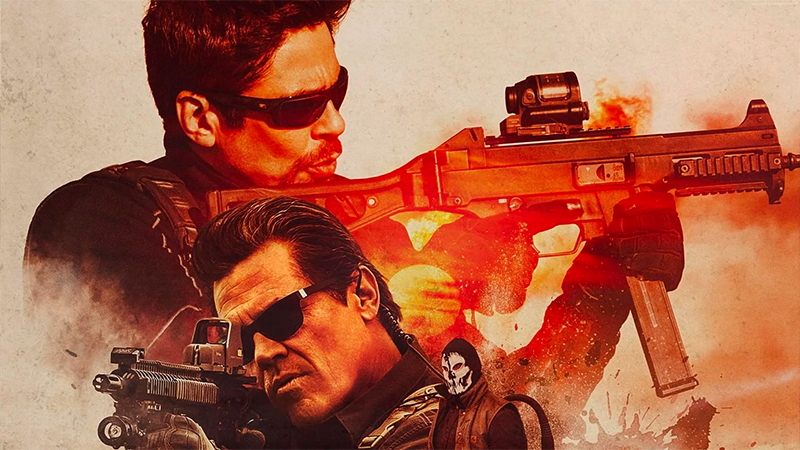Sicario: Day of the Soldado
Jul 14, 2018
Throughout Sicario: Day of the Soldado, characters talk about things needing to be ‘œclean,’ which pretty much means that a lot of people need to die. Making sure that a mission or a crime is ‘œclean’ means eliminating those who might know something about it and could therefore talk about it to the wrong people, and the fact that this term is repeatedly uttered by both the characters who represent ‘œus’ and the characters who represent ‘œthem’ suggests just how blurry the lines are between right and wrong, lawful and criminal, just and unjust. They are us, and we are them, and violence can only be met with more violence.
An extension of Denis Villeneuve’s Sicario (2015), which was also written by Taylor Sheridan (Hell or High Water, Wind River), Day of the Soldado again focuses on the nebulous, fraught space of the U.S./Mexico border, an area of conflict and death that has become more elevated in news and political rhetoric since the first film’s release. The stakes are raised even higher this time, as the U.S. is victim of a terrorist bombing, and the initial fear is that the terrorists infiltrated the country by coming up through Mexico. Knowing that the border is largely controlled on the Mexico side by the drug cartels, the U.S. government devises a plan to set the cartels against each other by kidnapping the daughter of one of the cartel heads and then blaming it on the other cartel, thus igniting a war that will hopefully extinguish them both. The idea is hatched by Matt Graver (Josh Brolin), the gruff CIA agent from the first film whose willingness to operate in the gray zone between the legal and the illegal makes him both dangerous and effective (we first see him in Africa interrogating a suspect in ways that definitely do not comport with the Geneva Convention).
The plan is to be run primarily by Alejandro (Benicio Del Toro), a former Mexican prosecutor-turned-black ops assassin who is wielded by the U.S. government like a weapon (he was a shadowy, marginal figure in the first film until taking center stage in the last act, and here he becomes the troubled protagonist). Alejandro is tasked with kidnapping Isabel Reyes (Isabela Moner), who just happens to be the daughter of the cartel leader who ordered the murder of his entire family (hence his dramatic shift from legal hawk to literal bird of prey). Yet, when things go wrong’”and they always go wrong’”Alejandro finds himself in the position of having to protect Isabel from the very government he’s working for, because, you know, it has to be ‘œclean’ (not that Isabel is in any way a saint or even an innocent, but still ‘¦). Alejandro is reluctant to follow the order that Graver is reluctant to give him at the insistence of Cynthia Foards (Catherine Keener), a Defense Department bureaucrat who orders the bloodletting but never has to really get any on her hands.
Taking the directorial reins from Villeneuve (who was probably too enmeshed in his planned adaptation of Frank Herbert’s Dune) is director Stefano Sollima, who has directed a handful of features and a lot of television series in his native Italy, including the mob epic Suburra (2015) and 10 episodes of the series Gomorrah (2014’“), based on Matteo Garrone’s brutal 2008 feature of the same title. Sollima certainly has a battle-tested grit to his style, and the content of Day of the Soldado meshes well with his earlier work; he is definitely well within his wheelhouse, even if he lacks Villeneuve’s sense of visual poetry (he benefits significantly from the brooding, evocative musical score by Hildur Gudnadottir, which builds on the late composer Johann Johannson’s menacing motifs). Sollima is more direct, as is Sheridan’s script. Day of the Soldado is more of a conventional action movie, even though it follows the first film’s narrative arc of intersecting the government activities with a seemingly unrelated plot involving Mexican characters on the ground, in this case involving Miguel (Elijah Rodriguez), a teenager who lives in a Texas border town and knows both sides of the line, which makes him particularly appealing to the coyotes who ferry migrants under the cover of night.
Sheridan is also working with less mystery this time, as Alejandro is no longer the enigma he was for most of the first film’”a coiled snake whose eventual strike was genuinely shocking for its mixture of logic and utter brutality. Knowing what he’s capable of makes him a slightly less interesting character this time around, although Sheridan attempts to compensate by giving him a more robust moral dimension, centering much of the story on the fallout from his refusal to murder a teenage girl, even though we know he could do it. The film’s morality is a mess, but that’s the point: There is evil on all sides, and the best we can do is sort through the debris and bury the bodies. Unlike the first film, which offered us Emily Blunt’s federal agent as a clear moral conscience, Day of the Soldado revels in various shades of gray with no hope of finding the light. The film’s startling cliff-hanger ending makes it clear that a third entry is (or will be) in the works, which is fitting since the issues both Sicario and Day of the Soldado mine have tangled legal, philosophical, and moral roots that go much deeper than we’d generally like to admit.
Copyright © 2018 James Kendrick
Thoughts? E-mail James Kendrick
All images copyright © Sony Pictures



